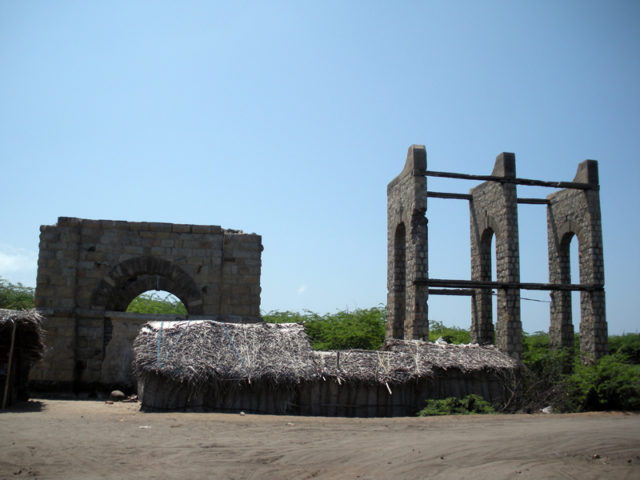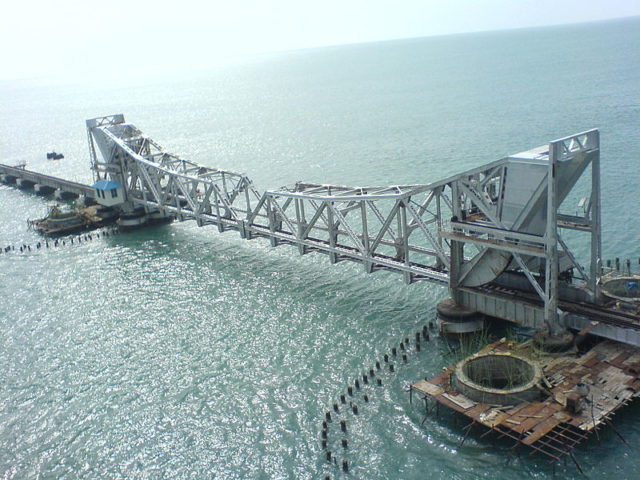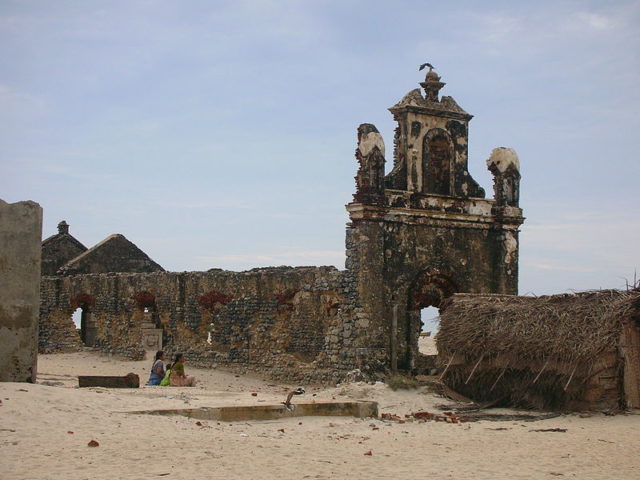Dhanushkodi is now an abandoned town at the south-eastern tip of Pamban Island of the Tamil Nadu state of India.
It is now a long barren stretch of sand without a desperate soul in sight, dilapidated buildings, small temples without rooftops, post offices without walls, and a once bustling railway station without a platform.
It evokes a ghostly eeriness even in broad daylight. The spectacular views of the quiescent Bay of Bengal and the distinguished Indian Ocean on either side make up this uninhabited town.

The name Dhanushkodi means “end of bow”, referring to the bow of Lord Rama. As Hindu legend has it, he used it to destroy the bridge after the war was over with Ravana, the king of Lanka. Lord Rama had built the bridge of “floating stones” to reach Sri Lanka to rescue his wife Sita from the clutches of Ravana.
Satellite pictures are confirming a million-year-old link (Adam’s Bridge) under water. Even more fascinating are the floating stones that are located in Hanuman Temple of Rameshwaram, strengthening the religious belief that these stones have been blessed by God.
The Pamban Bridge (Adam’s Bridge) is an architectural wonder. It was India’s first sea bridge on Palk Strait, which connects Rameshwaram to the mainland of India. It refers to both the rail and the road bridge.
The old rail bridge was ravaged by the 1964 super cyclone but was repaired in a record time of 46 days. The road bridge offers a spectacular view of the Indian Ocean, which sometimes appears vaster than the sky.

Dhanushkodi was once a flourishing town during the British regime; Dhanuskodi was a self-sufficient and prosperous place with a railway station, hospital, primary schools, post office, customs, and a port office.
The train service was called the Boat Mail and ran from Madras Egmore (Now Chennai Egmore). The train would stop at a pier on the southeastern side of Dhanushkodi township, where a waiting steamer would transport passengers to Sri Lanka across the Palk Strait.
The daily steamer ferry service carried passengers and goods from both shores, bolstering the local economy. Dhanuskodi was a very prosperous tourist and pilgrimage location with several hotels, lodges, market squares, and shopping centers.
On December 17, 1964, a massive depression formed in the South Andaman Sea and quickly developed into an enormous cyclone which eventually made landfall in Dhanushkodi on the fateful night of December 22.
Dangerous, life-threatening, 23-foot (7 meters) high tidal waves caused widespread devastation along with horrific casualties throughout the vulnerable town.
The storm’s ferocity completely destroyed the town and washed away an unsuspecting inbound passenger train into the sea. Over 100 souls were lost that night.

After assessing the devastation and past local history with cyclones, the Tamil Nadu government declared Dhanushkodi a “ghost town” and no person is allowed to go into the town after sunset.
Today, the rugged sandy terrain allows only four-wheel drive vehicles and thrill-seeking bikers to reach the end of the strip where the two oceans meet.
Standing on the edge of convergence you can feel the fine sands swirling and blasting against you while trying to distinguish between the mighty oceans combined with sounds of howling winds driving the infinite waves.
It can send you into a transcendent state where all of your thoughts stand still in time while you are captivated by your surroundings in a serene language of your own, The New Indian Express reported.
Dhanushkodi is not the place for a typical weekend getaway. There are no “sightseeing” attractions here or any opportunity for eating and shopping.
It’s a sandy grave of a thriving town, a desolate desert with decrepit structures and a grim reminder of our place in the cosmos. Visit Dhanushkodi between October and March to get submerged in nothingness – with no sense of time and space.
In addition, check this awesome video about Ghost Towns:
https://www.youtube.com/watch?v=aHJAoR0Jw58
